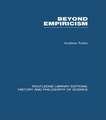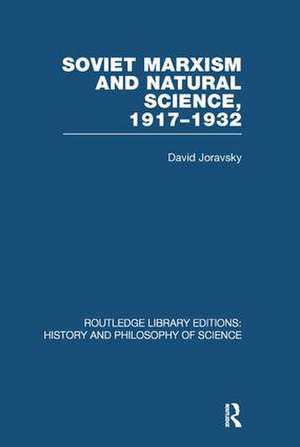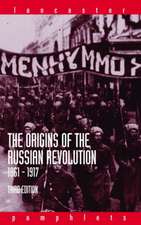Soviet Marxism and Natural Science: 1917-1932: Routledge Library Editions: History & Philosophy of Science
Autor David Joravskyen Limba Engleză Paperback – 10 apr 2013
| Toate formatele și edițiile | Preț | Express |
|---|---|---|
| Paperback (1) | 424.87 lei 6-8 săpt. | |
| Taylor & Francis – 10 apr 2013 | 424.87 lei 6-8 săpt. | |
| Hardback (1) | 1219.21 lei 6-8 săpt. | |
| Taylor & Francis – 18 aug 2008 | 1219.21 lei 6-8 săpt. |
Din seria Routledge Library Editions: History & Philosophy of Science
-
 Preț: 241.11 lei
Preț: 241.11 lei - 34%
 Preț: 987.58 lei
Preț: 987.58 lei -
 Preț: 409.48 lei
Preț: 409.48 lei -
 Preț: 190.51 lei
Preț: 190.51 lei -
 Preț: 193.40 lei
Preț: 193.40 lei -
 Preț: 408.54 lei
Preț: 408.54 lei -
 Preț: 481.58 lei
Preț: 481.58 lei - 30%
 Preț: 336.55 lei
Preț: 336.55 lei -
 Preț: 411.42 lei
Preț: 411.42 lei -
 Preț: 410.28 lei
Preț: 410.28 lei -
 Preț: 406.59 lei
Preț: 406.59 lei - 16%
 Preț: 226.72 lei
Preț: 226.72 lei - 34%
 Preț: 1047.71 lei
Preț: 1047.71 lei - 12%
 Preț: 299.52 lei
Preț: 299.52 lei -
 Preț: 215.72 lei
Preț: 215.72 lei -
 Preț: 413.33 lei
Preț: 413.33 lei - 34%
 Preț: 1046.46 lei
Preț: 1046.46 lei - 35%
 Preț: 1047.35 lei
Preț: 1047.35 lei - 36%
 Preț: 988.47 lei
Preț: 988.47 lei - 35%
 Preț: 1047.90 lei
Preț: 1047.90 lei - 34%
 Preț: 1044.84 lei
Preț: 1044.84 lei - 20%
 Preț: 143.04 lei
Preț: 143.04 lei - 24%
 Preț: 337.22 lei
Preț: 337.22 lei -
 Preț: 436.99 lei
Preț: 436.99 lei - 34%
 Preț: 1577.69 lei
Preț: 1577.69 lei -
 Preț: 413.33 lei
Preț: 413.33 lei - 34%
 Preț: 708.82 lei
Preț: 708.82 lei -
 Preț: 404.68 lei
Preț: 404.68 lei - 36%
 Preț: 1046.09 lei
Preț: 1046.09 lei - 36%
 Preț: 986.45 lei
Preț: 986.45 lei - 34%
 Preț: 1046.82 lei
Preț: 1046.82 lei
Preț: 424.87 lei
Nou
Puncte Express: 637
Preț estimativ în valută:
81.30€ • 84.89$ • 67.13£
81.30€ • 84.89$ • 67.13£
Carte tipărită la comandă
Livrare economică 15-29 aprilie
Preluare comenzi: 021 569.72.76
Specificații
ISBN-13: 9780415850780
ISBN-10: 0415850789
Pagini: 450
Dimensiuni: 156 x 234 mm
Greutate: 0.63 kg
Ediția:1
Editura: Taylor & Francis
Colecția Routledge
Seria Routledge Library Editions: History & Philosophy of Science
Locul publicării:Oxford, United Kingdom
ISBN-10: 0415850789
Pagini: 450
Dimensiuni: 156 x 234 mm
Greutate: 0.63 kg
Ediția:1
Editura: Taylor & Francis
Colecția Routledge
Seria Routledge Library Editions: History & Philosophy of Science
Locul publicării:Oxford, United Kingdom
Public țintă
Postgraduate, Professional, and UndergraduateCuprins
Part One: The Pre-Revolutionary Heritage. Part Two: The Soviet Setting, 1917-1929. Part Three: The Anomalous Rejection of Positivism. Part Four: The Great Break, 1929-1932. Part Five: Physics and Biology in the First Phase 1917-1932. Notes. Bibliography. Index
Descriere
In this volume the author correlates the development of ideas with trends in the Cultural Revolution and against this background it is possible to understand why debates over general philosophy gave way to conflicts over specific sciences in the aftermath of the first Five Year Plan and why there was a genuine crisis in Soviet biology.












